研究生--1以实践为基础的研究方法
- 格式:ppt
- 大小:2.76 MB
- 文档页数:36
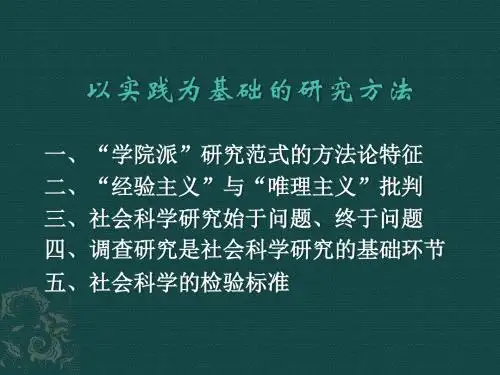

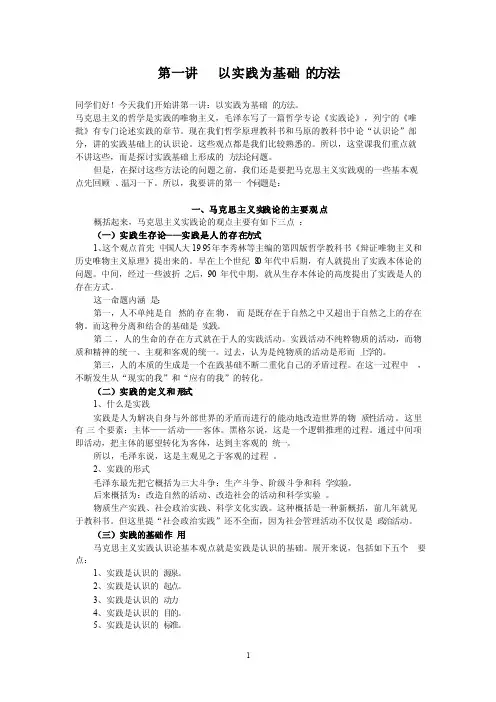
第一讲以实践为基础的方法同学们好!今天我们开始讲第一讲:以实践为基础的方法。
马克思主义的哲学是实践的唯物主义,毛泽东写了一篇哲学专论《实践论》,列宁的《唯批》有专门论述实践的章节。
现在我们哲学原理教科书和马原的教科书中论“认识论”部分,讲的实践基础上的认识论。
这些观点都是我们比较熟悉的。
所以,这堂课我们重点就不讲这些,而是探讨实践基础上形成的方法论问题。
但是,在探讨这些方法论的问题之前,我们还是要把马克思主义实践观的一些基本观点先回顾、温习一下。
所以,我要讲的第一个问题是:一、马克思主义实践论的主要观点概括起来,马克思主义实践论的观点主要有如下三点:(一)实践生存论——实践是人的存在方式1、这个观点首先中国人大1995年李秀林等主编的第四版哲学教科书《辩证唯物主义和历史唯物主义原理》提出来的。
早在上个世纪80年代中后期,有人就提出了实践本体论的问题。
中间,经过一些波折之后,90年代中期,就从生存本体论的高度提出了实践是人的存在方式。
这一命题内涵是:第一,人不单纯是自然的存在物,而是既存在于自然之中又超出于自然之上的存在物。
而这种分离和结合的基础是实践。
第二,人的生命的存在方式就在于人的实践活动。
实践活动不纯粹物质的活动,而物质和精神的统一、主观和客观的统一。
过去,认为是纯物质的活动是形而上学的。
第三,人的本质的生成是一个在践基础不断二重化自己的矛盾过程。
在这一过程中,不断发生从“现实的我”和“应有的我”的转化。
(二)实践的定义和形式1、什么是实践实践是人为解决自身与外部世界的矛盾而进行的能动地改造世界的物质性活动。
这里有三个要素:主体——活动——客体。
黑格尔说,这是一个逻辑推理的过程。
通过中间项即活动,把主体的愿望转化为客体,达到主客观的统一。

大数据以实践为基础的研究方法的意义大数据以实践为基础的研究方法具有重要意义。
随着信息技术的迅速发展和互联网的普及,人们的生活和工作方式发生了巨大的变化。
海量的数据被产生和收集并存储,这些数据包含了丰富的信息和隐藏的知识。
传统的研究方法往往无法有效地处理和分析这些数据,而大数据以实践为基础的研究方法可以更好地满足对数据进行深入挖掘和分析的需求。
首先,大数据以实践为基础的研究方法可以帮助我们更准确地了解现实世界。
传统的研究方法往往基于样本调查和实验设计,其结果往往具有一定的局限性。
而大数据可以基于现实生活中产生的大量数据,反映人们的真实行为和思想,从而更准确地反映现实情况。
例如,在传统的调查中,人们往往会有主观意识或者记忆偏差,而大数据可以提供客观的数据支撑,从而更准确地了解人们的行为和偏好。
其次,大数据以实践为基础的研究方法可以发现新的知识和发展新的理论。
传统的研究方法往往是基于已有的理论和假设进行实证研究,然后根据实证结果对理论进行修正或者进一步发展。
而大数据可以通过数据挖掘和机器学习等技术,从数据中发现新的规律和知识,甚至发展新的理论。
例如,通过对大量的社交网络数据进行分析,可以发现人们的社交网络结构和影响力传播规律,从而对社会网络理论进行深入研究和发展。
再次,大数据以实践为基础的研究方法可以为决策提供科学的依据。
在现实世界中,决策往往需要考虑多个因素和不确定性,传统的研究方法往往无法有效地处理这些复杂性和不确定性。
而大数据可以通过模型建立和数据分析,综合考虑多个变量和因素,帮助决策者做出科学合理的决策。
例如,通过对多个城市的交通数据进行分析,可以对交通拥堵情况进行预测,为交通管理和规划提供决策支持。
此外,大数据以实践为基础的研究方法也可以为社会和经济发展提供有力的支撑。
大数据的分析可以帮助企业和政府更好地了解市场需求和用户行为,从而优化产品开发和服务设计。
同时,大数据也可以为公共政策和社会问题的解决提供重要参考,例如为城市规划、环境保护和公共安全等提供决策支持。

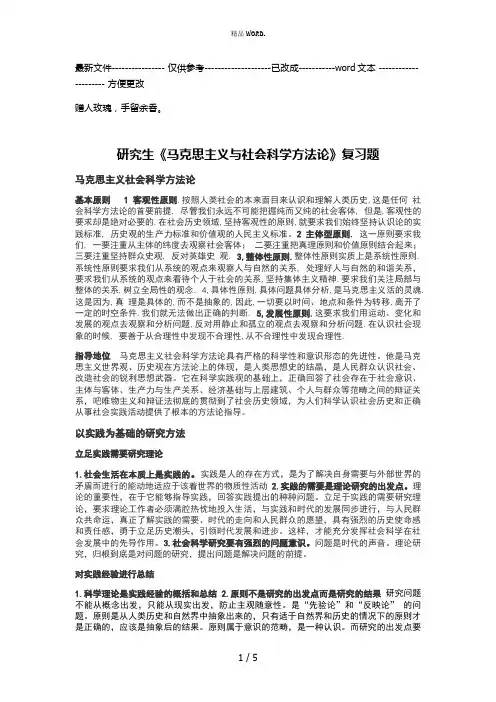
最新文件---------------- 仅供参考--------------------已改成-----------word文本 --------------------- 方便更改赠人玫瑰,手留余香。
研究生《马克思主义与社会科学方法论》复习题马克思主义社会科学方法论基本原则1客观性原则.按照人类社会的本来面目来认识和理解人类历史,这是任何社会科学方法论的首要前提. 尽管我们永远不可能把握纯而又纯的社会客体, 但是,客观性的要求却是绝对必要的.在社会历史领域,坚持客观性的原则,就要求我们始终坚持认识论的实践标准, 历史观的生产力标准和价值观的人民主义标准。
2主体型原则.这一原则要求我们, 一要注重从主体的纬度去观察社会客体;二要注重把真理原则和价值原则结合起来;三要注重坚持群众史观, 反对英雄史观. 3,整体性原则.整体性原则实质上是系统性原则.系统性原则要求我们从系统的观点来观察人与自然的关系, 处理好人与自然的和谐关系,要求我们从系统的观点来看待个人于社会的关系,坚持集体主义精神.要求我们关注局部与整体的关系,树立全局性的观念. 4,具体性原则.具体问题具体分析,是马克思主义活的灵魂.这是因为,真理是具体的,而不是抽象的,因此,一切要以时间、地点和条件为转移,离开了一定的时空条件,我们就无法做出正确的判断. 5,发展性原则.这要求我们用运动、变化和发展的观点去观察和分析问题,反对用静止和孤立的观点去观察和分析问题.在认识社会现象的时候, 要善于从合理性中发现不合理性,从不合理性中发现合理性.指导地位马克思主义社会科学方法论具有严格的科学性和意识形态的先进性。
他是马克思主义世界观、历史观在方法论上的体现,是人类思想史的结晶,是人民群众认识社会、改造社会的锐利思想武器。
它在科学实践观的基础上,正确回答了社会存在于社会意识、主体与客体、生产力与生产关系、经济基础与上层建筑、个人与群众等范畴之间的辩证关系,吧唯物主义和辩证法彻底的贯彻到了社会历史领域,为人们科学认识社会历史和正确从事社会实践活动提供了根本的方法论指导。
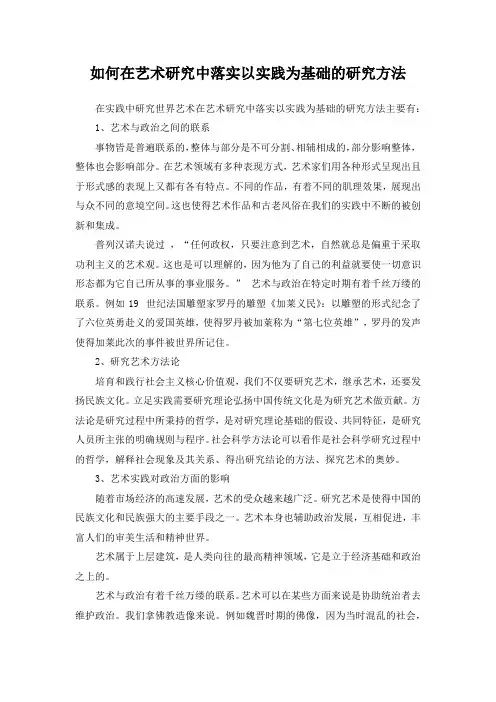
如何在艺术研究中落实以实践为基础的研究方法在实践中研究世界艺术在艺术研究中落实以实践为基础的研究方法主要有:1、艺术与政治之间的联系事物皆是普遍联系的,整体与部分是不可分割、相辅相成的,部分影响整体,整体也会影响部分。
在艺术领域有多种表现方式,艺术家们用各种形式呈现出且于形式感的表现上又都有各有特点。
不同的作品,有着不同的肌理效果,展现出与众不同的意境空间。
这也使得艺术作品和古老风俗在我们的实践中不断的被创新和集成。
普列汉诺夫说过,“任何政权,只要注意到艺术,自然就总是偏重于采取功利主义的艺术观。
这也是可以理解的,因为他为了自己的利益就要使一切意识形态都为它自己所从事的事业服务。
” 艺术与政治在特定时期有着千丝万缕的联系。
例如19 世纪法国雕塑家罗丹的雕塑《加莱义民》:以雕塑的形式纪念了了六位英勇赴义的爱国英雄,使得罗丹被加萊称为“第七位英雄”,罗丹的发声使得加莱此次的事件被世界所记住。
2、研究艺术方法论培育和践行社会主义核心价值观,我们不仅要研究艺术,继承艺术,还要发扬民族文化。
立足实践需要研究理论弘扬中国传统文化是为研究艺术做贡献。
方法论是研究过程中所秉持的哲学,是对研究理论基础的假设、共同特征,是研究人员所主张的明确规则与程序。
社会科学方法论可以看作是社会科学研究过程中的哲学,解释社会现象及其关系、得出研究结论的方法、探究艺术的奥妙。
3、艺术实践对政治方面的影响随着市场经济的高速发展,艺术的受众越来越广泛。
研究艺术是使得中国的民族文化和民族强大的主要手段之一。
艺术本身也辅助政治发展,互相促进,丰富人们的审美生活和精神世界。
艺术属于上层建筑,是人类向往的最高精神领域,它是立于经济基础和政治之上的。
艺术与政治有着千丝万缕的联系。
艺术可以在某些方面来说是协助统治者去维护政治。
我们拿佛教造像来说。
例如魏晋时期的佛像,因为当时混乱的社会,割炬分裂的统治时代,统治者迫切需要一种新的思想维持其统治。
而就在此刻,佛教的出现可以说是帮助统治者从精神层面掌控了人民。
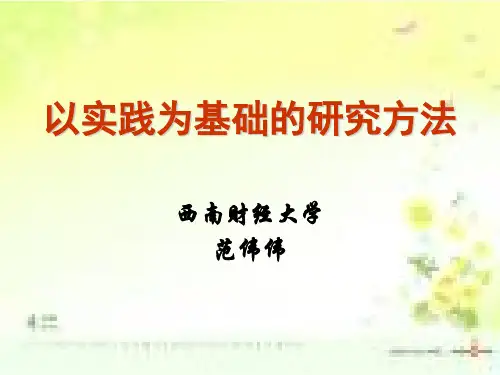
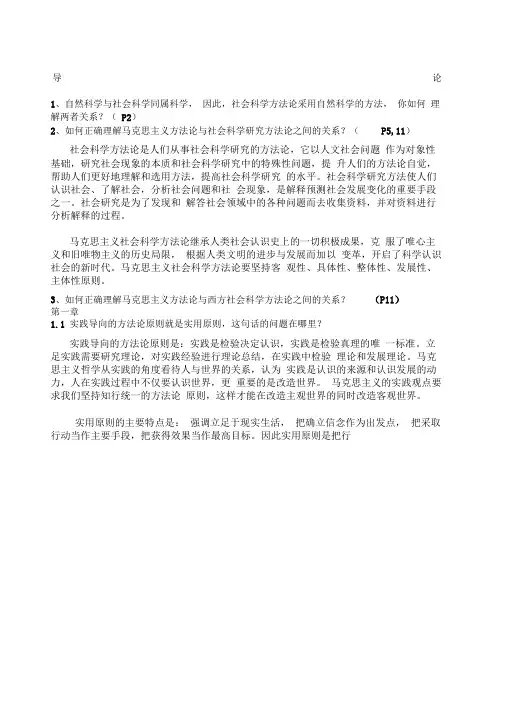
导论1、自然科学与社会科学同属科学,因此,社会科学方法论采用自然科学的方法,你如何理解两者关系?(P2)2、如何正确理解马克思主义方法论与社会科学研究方法论之间的关系?(P5,11)社会科学方法论是人们从事社会科学研究的方法论,它以人文社会问题作为对象性基础,研究社会现象的本质和社会科学研究中的特殊性问题,提升人们的方法论自觉,帮助人们更好地理解和选用方法,提高社会科学研究的水平。
社会科学研究方法使人们认识社会、了解社会,分析社会问题和社会现象,是解释预测社会发展变化的重要手段之一。
社会研究是为了发现和解答社会领域中的各种问题而去收集资料,并对资料进行分析解释的过程。
马克思主义社会科学方法论继承人类社会认识史上的一切积极成果,克服了唯心主义和旧唯物主义的历史局限,根据人类文明的进步与发展而加以变革,开启了科学认识社会的新时代。
马克思主义社会科学方法论要坚持客观性、具体性、整体性、发展性、主体性原则。
3、如何正确理解马克思主义方法论与西方社会科学方法论之间的关系?(P11)第一章1.1 实践导向的方法论原则就是实用原则,这句话的问题在哪里?实践导向的方法论原则是:实践是检验决定认识,实践是检验真理的唯一标准。
立足实践需要研究理论,对实践经验进行理论总结,在实践中检验理论和发展理论。
马克思主义哲学从实践的角度看待人与世界的关系,认为实践是认识的来源和认识发展的动力,人在实践过程中不仅要认识世界,更重要的是改造世界。
马克思主义的实践观点要求我们坚持知行统一的方法论原则,这样才能在改造主观世界的同时改造客观世界。
实用原则的主要特点是:强调立足于现实生活,把确立信念作为出发点,把采取行动当作主要手段,把获得效果当作最高目标。
因此实用原则是把行动的结果是否符合自己的主观意图作为取得“成功” 和“效果”的衡量标准。
认为只要行动的结果符合自己的主观愿望就是获得了成功、取得了效果,掌握了真理。
这种观点表面上同我们所说的实践是检验真理的标准似乎没有什么两样,但实际上,实用原则的认识论和真理观与马克思主义的认识论和真理观根本不同。
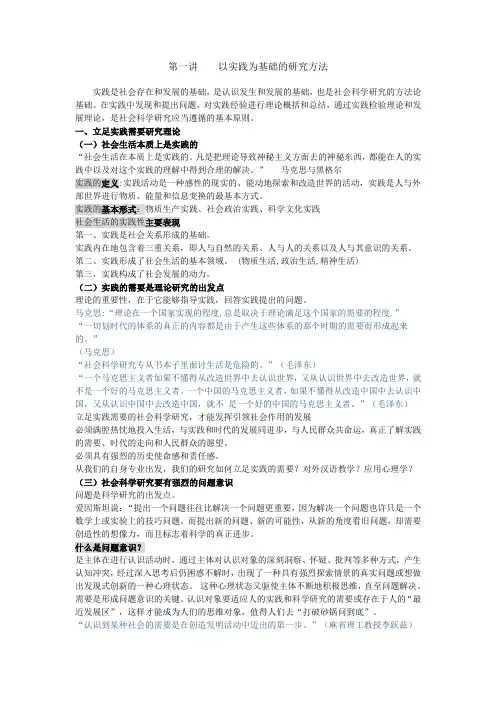
第一讲以实践为基础的研究方法实践是社会存在和发展的基础,是认识发生和发展的基础,也是社会科学研究的方法论基础。
在实践中发现和提出问题,对实践经验进行理论概括和总结,通过实践检验理论和发展理论,是社会科学研究应当遵循的基本原则。
一、立足实践需要研究理论(一)社会生活本质上是实践的“社会生活在本质上是实践的。
凡是把理论导致神秘主义方面去的神秘东西,都能在人的实践中以及对这个实践的理解中得到合理的解决。
”马克思与黑格尔实践的定义:实践活动是一种感性的现实的、能动地探索和改造世界的活动,实践是人与外部世界进行物质、能量和信息变换的最基本方式。
实践的基本形式:物质生产实践、社会政治实践、科学文化实践社会生活的实践性主要表现第一、实践是社会关系形成的基础。
实践内在地包含着三重关系,即人与自然的关系、人与人的关系以及人与其意识的关系。
第二、实践形成了社会生活的基本领域。
(物质生活,政治生活,精神生活)第三,实践构成了社会发展的动力。
(二)实践的需要是理论研究的出发点理论的重要性,在于它能够指导实践,回答实践提出的问题。
马克思:“理论在一个国家实现的程度,总是取决于理论满足这个国家的需要的程度.”“一切划时代的体系的真正的内容都是由于产生这些体系的那个时期的需要而形成起来的。
”(马克思)“社会科学研究专从书本子里面讨生活是危险的。
”(毛泽东)“一个马克思主义者如果不懂得从改造世界中去认识世界,又从认识世界中去改造世界,就不是一个好的马克思主义者。
一个中国的马克思主义者,如果不懂得从改造中国中去认识中国,又从认识中国中去改造中国,就不是一个好的中国的马克思主义者。
”(毛泽东)立足实践需要的社会科学研究,才能发挥引领社会作用的发展必须满腔热忱地投入生活,与实践和时代的发展同进步,与人民群众共命运,真正了解实践的需要、时代的走向和人民群众的愿望。
必须具有强烈的历史使命感和责任感。
从我们的自身专业出发,我们的研究如何立足实践的需要?对外汉语教学?应用心理学?(三)社会科学研究要有强烈的问题意识问题是科学研究的出发点。

精心整理1.如何理解社会科学方法论的性质和特点:方法是主体依据对客体发展规律的认识而为自己规定的活动方式和行为准则,是人们实现特定目的的手段或途径,是主体接近、把握以至改造客体的工具或桥梁。
方法论是关于方法的理论,它以多种多样的方法为研究对象,探讨方法的基本原理社会科学研究的方法论特点:第一,2.如何理解社会系统研究方法和社会矛盾研究方法的关系:*所谓社会系统研究方法,就是从系统观点出发,按照社会本身的系统性,从社会整体与其组成要素和结构之间以及与自然系统的相互联系相互用、相互制约的关系中,综合、精确地考察社会的一会方法论体系。
主要包括整体分析方法、结构分析方法、层次分析方法、历史性方法和协同相关分析方法。
社会系统研究方法是马克思主义认识社会和改造社会的锐利思想武器。
*社会矛盾分析方法是指观察和分析各种事物的矛盾运动,进而解决矛盾的一种方法,是人基本方法之一,对研究社会现象具有普遍适用性。
石主流,法的主要内容。
会,都属于马克思主义社会科学方法论,是一种并列的关系。
系统分析方法以矛盾分析方法为指导.系统强调要素之间的彼此协调与相互促进,但是这并不是说系统之间没有差异与矛盾的存在。
与此相反,系统分析方法正是在以矛盾分析方法为指导的基础上发展建立起来的,并且不断地丰富着矛盾学说。
系统学说从实质上说就是一个多维的立体的矛盾网络。
矛盾分析方法与系统分析方法之间具有辩证统一性,矛盾是有系统性的矛盾体,而系统则是包含着矛盾的系统。
矛盾分析方法为系统分析方法提供指导,为系统分析方法的具体实施是供可能;步的补充;分析统一的整体,而系法的具体实施提供可能;系统分析方法是矛盾分析方法的丰富发展,为矛盾分析方法的运用作进一步的补充;矛盾分析方法与系统分析方法在实践中达到真正的统一。
3.应用以实践为基础的研究方法论述改革开放初期实践是检验真理的唯一标准的讨论意义:实践是检验真理的唯一标准,这是由真理的木性和实践的特点所决定的。
以实践为基础的研究方法在初高中英语教学研究中的应用全文共6篇示例,供读者参考篇1The Fun Way to Learn English - Trying It Out!Hey there, friends! Today, we're going to talk about a super cool way to learn English – by actually doing it! It's called the "practice-based research method," and it's like a fun game that helps you get better at speaking, reading, and writing in English.Imagine you're trying to learn how to ride a bike. You could read all the books and watch all the videos about bike riding, but at some point, you've got to hop on that bike and give it a try! That's what the practice-based research method is all about –learning by doing.In English class, your teacher might use this method to help you practice your skills in a real-life way. Instead of just memorizing grammar rules or vocabulary words, you'll get to use them in fun activities and projects. It's like learning to swim by jumping into the pool instead of just reading about it!One way your teacher could use this method is by having you write stories or plays in English. You'd get to use your imagination and put all those grammar rules and vocabulary words into action. Then, you could perform your stories or plays for the class, which would help you practice your speaking and pronunciation skills too!Another cool thing your teacher might do is set up a pretend store or restaurant in the classroom. You and your classmates could take turns being the customers and the employees, ordering food or buying things in English. It would be like a real-life practice session for using English in everyday situations!Sometimes, your teacher might even take you on field trips to places where you can use English in the real world. You could visit a museum or a park and have conversations withEnglish-speaking tour guides or other visitors. It would be like a fun adventure and a learning experience all rolled into one!The best part about the practice-based research method is that it makes learning English feel like playtime. Instead of just sitting at your desk and doing worksheets, you'll be up and moving around, talking and interacting with your classmates and teacher. It's a way to make learning English feel natural andenjoyable, just like how you learned your first language by listening and speaking to the people around you.So, the next time your English teacher tells you that you're going to be doing a practice-based activity, get excited! It means you're about to learn English in a whole new way – by actually using it and having fun while doing it.Who knows, maybe one day you'll be so good at English that you can write your own stories or plays or even become a tour guide yourself! All it takes is a little practice, a lot of fun, and a willingness to try something new.篇2Sure! Here's a 1000-word article written in English, using a language that reflects the voice of an elementary school student:The Fun of Learning English: Using Practical Methods in TeachingHi everyone! Today, I want to share with you how we can make learning English more exciting and interesting in our schools. You know, learning a new language can be quite challenging, but if we use practical methods, it can become a lot of fun!First of all, what do I mean by "practical methods"? Well, it means learning by doing things, not just by reading textbooks or listening to the teacher. It's like when we learn to ride a bicycle. We don't just read about it, right? We actually get on the bike, pedal, and practice! The same goes for learning English.One practical method that we can use is called"role-playing." It's like acting, but in English! We can pretend to be different characters and have conversations in English. For example, we can have a pretend restaurant and take turns being the waiter and the customer. We can order food, ask for the bill, and even practice saying "please" and "thank you." It's so much fun!Another practical method is using real-life situations. We can learn English by talking about things that happen in our daily lives. For example, we can talk about our families, our hobbies, or our favorite foods. We can interview our classmates and ask them questions in English. This way, we not only learn new words and grammar, but we also get to know each other better!Next, let's talk about using technology in our English classes. Nowadays, we have so many cool gadgets and apps that can help us learn English in a fun way. We can use interactive games on tablets or computers to practice vocabulary and grammar.There are also online videos and songs that can improve our listening skills. Learning English can be as easy as playing our favorite video games!Now, you might be wondering, "But how does all of this help us in the long run?" Well, when we learn English through practical methods, we actually remember things better. It's like when we learn to swim. If we only read about swimming or watch others swim, we won't really know how to do it ourselves. But if we jump into the water and practice, we become better swimmers. The same principle applies to learning English.Practical methods also help us become more confident in using English. When we practice speaking and using English in real-life situations, we become more comfortable with the language. We won't be afraid to make mistakes because we know that making mistakes is a part of learning. And guess what? The more we practice, the better we get!In conclusion, using practical methods in teaching English can make our learning experience more enjoyable and effective. Whether it's through role-playing, real-life situations, or technology, we can have fun while learning and become more confident English speakers. So, let's embrace these methods and make our English classes the best they can be!I hope you found this article helpful and inspiring. Remember, learning English can be an adventure, and with practical methods, we can make it a fun and exciting one! Keep practicing and never give up. Good luck, my fellow English learners!Word Count: 443篇3The Awesome World of Learning English Through Doing!Hi there, friends! My name is Emma, and I'm a 10-year-old English learner. Today, I want to share with you all an exciting way to learn English that my teacher introduced to our class – it's called the "practice-based research method." Sounds fancy, right? But trust me, it's super fun and really helps us understand English better!You see, instead of just sitting in class and listening to our teacher explain grammar rules or vocabulary words, we actually get to do activities and practice using English in real-life situations. It's like learning by doing, which is way more enjoyable than just memorizing stuff from books.One of my favorite practice-based activities is role-playing. We pretend to be in different situations, like ordering food at a restaurant or asking for directions on the street. It's hilarious when my classmates try to act out these scenes, and we all end up laughing like crazy! But you know what? We're also learning how to communicate in English naturally, without feeling too nervous or scared.Another cool thing we do is project-based learning. Our teacher gives us a task, like creating a video about our school or writing a short story, and we have to work together in groups to complete it. Not only do we practice our English skills, but we also learn teamwork and problem-solving skills. It's like killing two birds with one stone!But wait, there's more! Sometimes, our teacher takes us on field trips to places where we can use English in real-life situations. We've been to a museum, a restaurant, and even a local park. It's so much fun to practice our English outside the classroom and see how people actually use it in the real world.And you know what's really cool? Our teacher encourages us to reflect on our learning experiences and give feedback. She wants to know what works for us and what doesn't, so she can adjust the activities and make them even better. It's like we're allpart of this big research project, trying to figure out the best ways to learn English.I have to admit, at first, I was a bit nervous about all this "practice-based research" stuff. It sounded complicated and like a lot of work. But now, I can't imagine learning English any other way. It's so much more fun and engaging than just sitting in class and listening to lectures all day.So, if you're an English learner like me, I highly recommend trying out this practice-based research method. It might seem a bit different from what you're used to, but trust me, it's worth it. You'll not only improve your English skills but also have a blast while doing it!Well, that's all I have to share for now. I hope you found my experience interesting and maybe even a little bit inspiring. Remember, learning English doesn't have to be boring – it can be an awesome adventure filled with fun, laughter, and lots ofreal-life practice!Until next time, keep practicing, keep exploring, and keep having fun with English!篇4The Awesome World of Learning English Through Doing!Hi there, friends! My name is Lily, and I'm a 10-year-old student who loves learning English. Today, I want to share with you something really cool that my English teacher taught us about – it's called "practice-based research methods." At first, it sounded a bit complicated, but once I understood what it meant, I realized how awesome it is!You see, in our English class, we don't just sit and listen to our teacher talk all the time. Instead, we get to do a lot of fun activities and games that help us learn new words, practice speaking, and even make mistakes (which is totally okay because that's how we learn!). Our teacher calls this "learning by doing," and it's so much more exciting than just reading from a textbook.One of the coolest things we do is something called "action research." It's like a fun experiment where our teacher tries out different teaching methods with us, and then we get to give our honest opinions about what worked well and what didn't. For example, last month, our teacher introduced a new game to help us practice past tense verbs. Some of us loved it, but others found it a bit confusing. So, our teacher took our feedback and made some changes to the game to make it even better!Another thing we do is called "reflective practice." This is where our teacher thinks carefully about how each lesson went and what she could do differently next time. Sometimes, she even asks us for our ideas on how to make the lessons more fun or easier to understand. It's really cool that our opinions matter so much!But wait, there's more! Our teacher also involves our parents in this whole process. She sends them updates on what we're learning and how they can support us at home. Sometimes, she even asks them for suggestions on activities or topics that we might be interested in. It's like one big team effort to make our English learning experience the best it can be!I know what you're thinking – this all sounds like a lot of work for our teacher. And you're right, it is! But you know what? She doesn't mind at all because she says that seeing us learn and have fun is the most rewarding part of her job.One of the things I love most about this "practice-based research" approach is that it's not just about memorizing grammar rules or vocabulary lists. It's about actually using the language in real-life situations and learning through experience. That's why we do a lot of role-plays, group discussions, and evenlittle skits in class. It's like we're not just learning English, but also how to communicate effectively and work together as a team.And you know what else is cool? Our teacher says that by doing all these practice-based activities, we're actually helping her understand what works best for teaching English to kids our age. She shares her findings with other teachers, and they can learn from our experiences too! It's like we're not just students, but little researchers helping to make English education better for everyone.So, there you have it, friends – the amazing world of learning English through doing! It's not just about sitting in a classroom and listening to someone talk at you. It's about getting involved, trying new things, making mistakes, and having fun while you're at it. And who knows, maybe someday you'll be the one helping teachers figure out the best ways to teach English to kids like you!Well, that's all from me for now. I've got to go practice my English by putting on a little skit with my friends. We're working on our dialogue skills, and our teacher said she might even turn it into a mini-play for our parents to watch. How cool is that? See you next time, and keep on learning and having fun!篇5The Application of Practice-Based Research Methods in English Teaching Research in Primary and Secondary SchoolsHey there, friends! Today, I want to talk to you about something super cool and important in the world of education –practice-based research methods and how they can be used to study English teaching in primary and secondary schools.Now, I know what you're thinking, "Research? That sounds boring!" But trust me, it's actually really exciting and can help make learning English even more fun and effective. You see, practice-based research is all about studying how teachers teach and how students learn, right in the classroom.Imagine you're a scientist, but instead of studying plants or animals, you're studying the way your English teacher explains grammar rules or how your classmates practice their reading skills. That's what practice-based research is all about –observing and analyzing what's happening in the classroom to find better ways of teaching and learning.One of the coolest things about practice-based research is that it involves everyone – teachers, students, and even researchers working together as a team. It's like a big, excitingadventure where everyone plays a role in discovering new and better ways to learn English.For example, let's say a researcher wants to study how well students understand and remember new vocabulary words. They might come to your class and observe how your teacher introduces the words, how you practice them, and how well you remember them later on. Then, they can use that information to suggest new and improved methods for teaching vocabulary.Or maybe a teacher wants to try out a new way of teaching grammar, like using games or songs. With practice-based research, they can carefully observe how well the new method works, get feedback from students like you, and make adjustments to make it even better.But practice-based research isn't just about observing and analyzing – it's also about trying out new ideas and seeing what works best. It's like a big experiment where everyone gets to be a part of the fun!Imagine your class trying out a new way of practicing conversation skills, like roleplaying different situations or using technology like video chats with students from other schools. The researchers would observe how well it works, ask for youropinions, and then use that information to improve the method or come up with entirely new ideas.And the best part? You, the students, get to be a huge part of the process! Your feedback, your experiences, and your ideas are all incredibly valuable in practice-based research. It's like you're not just learning English, but you're also helping to shape the way it's taught for future generations of students.So, the next time you see a researcher in your classroom or your teacher tries out a new teaching method, don't be surprised – it's all part of the exciting world of practice-based research in English teaching. Get ready to be a part of the adventure and help make learning English even more awesome!篇6Title: Learning English Can Be Fun and Exciting!Hey there, friends! Have you ever wondered why we need to learn English at school? Well, let me tell you, it's an awesome language that can take you on incredible adventures and help you make new friends from all around the world!Imagine being able to read your favorite books, watch your favorite movies, or play your favorite video games withoutneeding someone to translate them for you. That's the power of English! It's like having a magic key that unlocks a whole new world of fun and excitement.But learning a new language can be tricky, right? That's why our teachers use special methods to make it easier and more enjoyable for us. One of these methods is called "practice-based research." It sounds a bit complicated, but it's actually really cool!Practice-based research means that our teachers don't just teach us from books or lectures. Instead, they let us practice using English in real-life situations. For example, they might ask us to role-play a conversation between friends or act out a scene from a story. This way, we get to use the language we're learning in a fun and natural way.Another great thing about practice-based research is that it helps our teachers understand how we learn best. They observe us during these practice sessions and take notes on what works well and what we struggle with. Then, they can adjust their teaching methods to better suit our needs.Imagine you're playing a game, and your coach is watching you closely to figure out how to help you improve your skills. That's kind of like what our English teachers do withpractice-based research!But it's not just about practicing conversations or acting out scenes. Our teachers also give us opportunities to practice writing in English. We might have to write letters to pen pals from other countries, create stories or poems, or even write scripts for short plays or skits.And you know what's really cool? Sometimes, our teachers even let us use technology to practice our English skills. We might get to make videos, record podcasts, or create digital stories. It's like bringing our English lessons to life in the most fun and interactive way possible!So, the next time you're in an English class and your teacher asks you to role-play or do an activity, don't think of it as just another boring exercise. Instead, remember that you're taking part in an exciting adventure called "practice-based research," and it's helping you become a true English language explorer!Who knows, maybe someday you'll be able to use your English skills to travel the world, make new friends from different countries, or even work in a cool job where you get to use English every day. The possibilities are endless when you have the power of language on your side!So, keep practicing, keep having fun, and never stop exploring the wonderful world of English. Trust me, it's going to be an amazing journey!。
以实践为基础的研究方法对英语学习的指导意义
以实践为基础的研究方法在英语学习中被越来越多地重视,它给英语学习者带来了积极的指导意义。
首先,以实践为基础的研究方法有助于提高学习者的学习热情。
英语学习者通过模仿、操练等实践性的活动学习语言知识,不刻板、简易,更能激发学习者学习英语的兴趣和热情,有利于英语学习者记忆语言知识和建立信心。
此外,以实践为基础的研究方法有助于提高英语学习者的应用能力。
以实践为基础的研究方法不仅注重记忆,同时更注重对所学知识的运用能力和技能,让英语学习者真正掌握能够在实际情境中使用的英语应用技能,使英语学习者从理论学习到实践学习,较充分地发展自身的应用能力。
最后,以实践为基础的研究方法有助于提高学习者的情景意识。
能够操练所学知识,重点强调对语言知识的实践应用,有助于提高英语学习者对所学内容的消化吸收和记忆程度,帮助学习者熟悉语言在具体场景中的使用和实际应用,培养学习者情境意识。
通过以上分析,可以得出结论:以实践为基础的研究方法对于英语学习有着极其积极的指导意义。
它启发学习者记忆知识,实践知识以及培养情境意识,帮助英语学习者正确理解所学英语,从而更自如地运用英语,达到预期的学习效果。